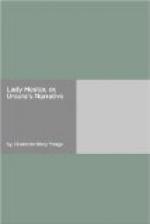He had been quartered at Belfast, and we had written to him the day after my father’s illness, to summon him home, but there were no telegraphs nor railways; and there had been some hindrance about his leave, so that it had taken all that length of time to bring him. Fulk had left all to be told on his arrival. He had come by the mail-coach, and walked up from the Trevorsham Arms, where he had been told of our father’s death; and so had let himself in noiselessly, and was standing in the dining-room door, hearing all that Fulk said!
Poor fellow! Jaquetta flung herself on him, hiding her face against him, while the servants went, and before any one else could speak, Hester stood forth, and said, to our amazement—
“Captain Trevor! You know me. You can and must bear me witness, and do me justice—”
“You! I have seen you before—but—where? I beg your pardon,” he said, bewildered.
“You remember Sault St. Pierre farm?” she said.
“Sault St. Pierre! What? You are Mrs. Lea! Good heavens! Where is your mother?”
“My mother is dead, sir. You were the first person who made known to her that her husband, my father, was not dead, but had taken—or pretended to take—an English woman for his wife.”
“Wait!” thundered Fulk, “whatever my father did was ignorantly and honourably done!”
Bertram was as pale as death, and looked from one of us to the other, and at last, he gasped out—
“And that—was what she meant?”
“There, sir,” said Hester, turning to Torwood, “You see your brother cannot deny it! You will not refuse justice to me, and my son.”
I fancy she expected that the house was to be given up to her, and that we were only to remain there on her sufferance, perhaps till after the funeral.
My brother spoke, “Justice will no doubt be done; but the question does not lie between you and me, but between me and Alured. It is, as I said, a peerage question—and will be decided by the peers. Incidentally, that enquiry will prove what is your position and rank, as well as what may or may not be ours. Any further points depend upon my father’s will, and that will be in the hands of Mr. Eagles. I think you can see that it would be impossible, as well as unfeeling, to take any steps until after the funeral.”
Whatever Hester Lea was, she was a high-spirited being, standing there, a solitary woman, a stranger, with all of us four, and one whole household, as it must have seemed, against her. I was outraged and shocked at her defiance at the time, but when, some time after, I re-read King John, I saw that there was something of Constance in her.
“That may be,” she answered, “but when my child’s interests are at stake, I cannot haggle over conventionalities and proprieties. I am the Earl of Trevorsham’s only legitimate daughter, and I claim my right to remain in his house, and to take charge of my infant brother.”




